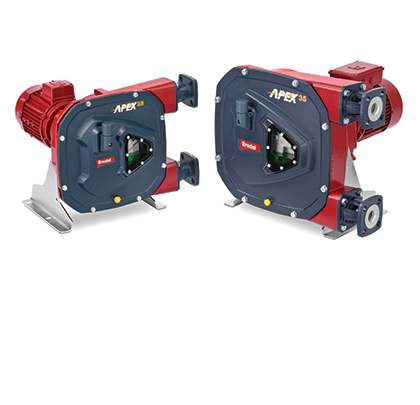Recent trials of new hose pump technology at EEW Saarbrücken GmbH, a waste-heat plant in Germany, has demonstrated significant potential pump maintenance cost savings. Not only does the pump run without clogging for much longer than its predecessor when pumping abrasive brine, downtime and replacement part costs are also greatly reduced.
The Bredel APEX35 pump, produced by Watson-Marlow Fluid Technology Group, has fewer parts to replace during maintenance operations, at much lower cost, and maintenance routines are much quicker. The trials demonstrated that the new hose pump technology is especially suited for handling difficult fluids—those that are abrasive, corrosive, viscous, shear-sensitive, gaseous, or crystalizing, or even fluids with a combination of these properties.
WASTE HEAT POWER PLANT PRODUCES ABRASIVE SLURRY
EEW Saarbrücken GmbH, MHKW Pirmasens, operates a waste-heat power plant in Pirmasens, Germany. Each year the facility recycles approximately 180,000 tons of waste, generating about 75,000 megawatt-hours (MWh) of electricity (enough for 20,000 households). It also produces 25,000 MWh of district heating (enough for 2000 households). The electricity and district heating saves about 13.7 million gallons of heating oil annually.
Among the site’s operations is the separation of crystalline sodium chloride from its highly concentrated solution in the process water before disposal. A special centrifuge is used as a thickener to separate the solution from the abrasive salt slurry, called brine or solebrei, which has a density of about 18 pounds per gallon.
EEW had been using a progressive cavity pump to feed the centrifuge (flooded suction, 14.5 pounds per square inch (psi) back pressure), for approximately 1.5 hours every 3-4 hours in a 24/7 operation. However, the abrasive nature of the brine demanded the repair of the pc pump stator or rotor every month, along with occasional replacement of the linings. Furthermore, not only would it take a minimum of four hours to perform the repairs (using expensive replacement consumables), but the pump would also have to be removed from the process line.
Dissatisfied with the situation and looking for a replacement option that would offer the greatest potential maintenance savings for this abrasive handling, intermittent duty application, EEW plant engineers requested a trial of the new Bredel APEX35 hose pump.
TRIALS SHOW SIGNIFICANT WEAR REDUCTIONS
Recent international product trials in process-critical abrasive slurry transfer operations demonstrated that the new APEX models can dramatically extend the time between scheduled maintenance intervals compared with air-operated diaphragm pumps and progressive cavity pumps.
U.S. trials showed significant reductions in abrasive wear compared to previous pumps. While the user’s existing air-operated diaphragm pumps require maintenance every seven or ten days, the APEX35 ran continuously for more than three months without maintenance. Additionally, there was no requirement for compressed air, which equated to another significant saving. A brine dosing application in Germany showed that during the first six months of the trial, the APEX35 required no maintenance whatsoever and the operator made huge savings over the downtime previously experienced each month with a progressive cavity pump.
In addition to the financial benefits associated with reduced maintenance, APEX pumps have been engineered to deliver additional cost savings through increased uptime and process continuity. Precision machined hose elements and optimized hose compression, combined with medium pressure operation, enable the pumps to meter or transfer fluids reliably and accurately for long, uninterrupted periods of time.
REDUCED MAINTENANCE AND SHORT PAYBACK PERIOD
Project payback periods for APEX are expected to be extremely short, since the only wear part is the hose, which can be replaced quickly and easily, without removing it from the process line. With no internal valves, Bredel APEX hose pump technology also helps users improve their processes by eliminating troublesome ancillary equipment such as anti-siphon valves, back-pressure valves, degassing valves or run-dry protection. In addition, customers can simplify spares inventory, since the hose is the only part that needs to be kept in stock.
During the first six months of the trial, the APEX35 required no maintenance whatsoever. Since the hose is the only wear part, it could be replaced quickly and easily in twenty minutes—and without removing it from the process line. Considering that a replacement stator alone for the progressive cavity pump costs about is thought to cost nearly $1700, the projected payback period is extremely short. There are also inventory savings, since the hose is the only item that needs to be kept in stock.
A major advantage of the new hose pump technology when handling abrasive substances is that they have no costly wearing components like seals, valves, membranes, stators, rotors, or glands to maintain. Self-priming, dry running, and with no internal valves, hose pump technology also helps users improve their processes by eliminating troublesome ancillary items like anti-siphon valves, back-pressure valves, degassing valves or run-dry protection
Doreen Goodrich is marketing communications manager of Bredel Hose Pumps for Watson-Marlow Fluid Technology Group and can be reached at 978.988.5309 or via email at doreen.goodrich@wmftg.com. Watson-Marlow Fluid Technology Group (WMFTG) is the world leader in niche peristaltic and sinusoidal pumps and associated fluid path technologies. Founded on nearly sixty years of supplying engineering and process expertise and with over one million pumps installed worldwide, our pumps are tried, tested and proven to deliver. For more information, visit www.watson-marlow.com.
____________________________________________
MODERN PUMPING TODAY, August 2015
Did you enjoy this article?
Subscribe to the FREE Digital Edition of Modern Pumping Today Magazine!
![]()


